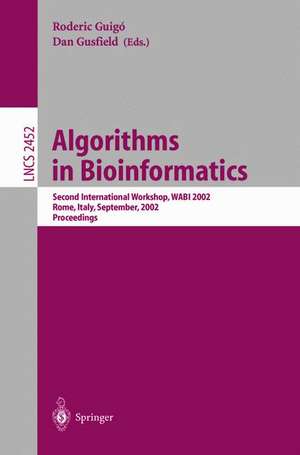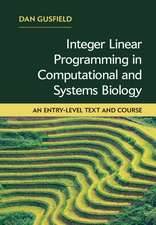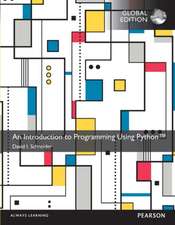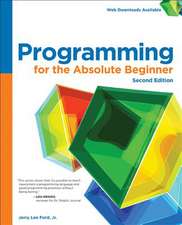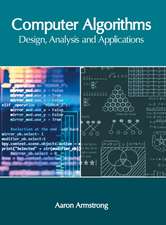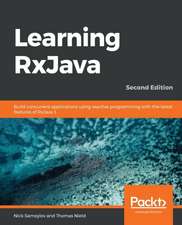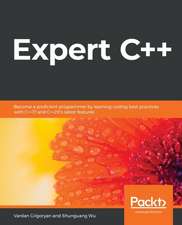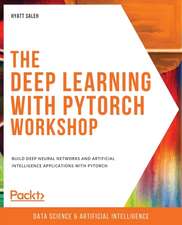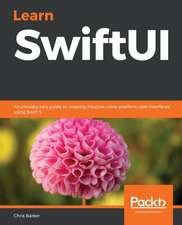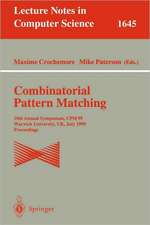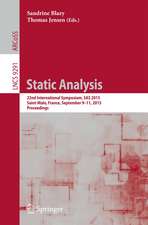Algorithms in Bioinformatics: Second International Workshop, WABI 2002, Rome, Italy, September 17-21, 2002, Proceedings: Lecture Notes in Computer Science, cartea 2452
Editat de Roderic Guigo, Dan Gusfielden Limba Engleză Paperback – 2 sep 2002
Din seria Lecture Notes in Computer Science
- 20%
 Preț: 1040.03 lei
Preț: 1040.03 lei - 20%
 Preț: 333.46 lei
Preț: 333.46 lei - 20%
 Preț: 335.08 lei
Preț: 335.08 lei - 20%
 Preț: 444.17 lei
Preț: 444.17 lei - 20%
 Preț: 238.01 lei
Preț: 238.01 lei - 20%
 Preț: 333.46 lei
Preț: 333.46 lei - 20%
 Preț: 438.69 lei
Preț: 438.69 lei -
 Preț: 440.52 lei
Preț: 440.52 lei - 20%
 Preț: 336.71 lei
Preț: 336.71 lei - 20%
 Preț: 148.66 lei
Preț: 148.66 lei - 20%
 Preț: 310.26 lei
Preț: 310.26 lei - 20%
 Preț: 256.27 lei
Preț: 256.27 lei - 20%
 Preț: 632.22 lei
Preț: 632.22 lei - 17%
 Preț: 427.22 lei
Preț: 427.22 lei - 20%
 Preț: 641.78 lei
Preț: 641.78 lei - 20%
 Preț: 307.71 lei
Preț: 307.71 lei - 20%
 Preț: 1053.45 lei
Preț: 1053.45 lei - 20%
 Preț: 579.56 lei
Preț: 579.56 lei -
 Preț: 373.56 lei
Preț: 373.56 lei - 20%
 Preț: 330.23 lei
Preț: 330.23 lei - 15%
 Preț: 429.74 lei
Preț: 429.74 lei - 20%
 Preț: 607.39 lei
Preț: 607.39 lei - 20%
 Preț: 538.29 lei
Preț: 538.29 lei -
 Preț: 389.48 lei
Preț: 389.48 lei - 20%
 Preț: 326.98 lei
Preț: 326.98 lei - 20%
 Preț: 1386.07 lei
Preț: 1386.07 lei - 20%
 Preț: 1003.66 lei
Preț: 1003.66 lei - 20%
 Preț: 567.60 lei
Preț: 567.60 lei - 20%
 Preț: 575.48 lei
Preț: 575.48 lei - 20%
 Preț: 571.63 lei
Preț: 571.63 lei - 20%
 Preț: 747.79 lei
Preț: 747.79 lei - 15%
 Preț: 568.74 lei
Preț: 568.74 lei - 17%
 Preț: 360.19 lei
Preț: 360.19 lei - 20%
 Preț: 504.57 lei
Preț: 504.57 lei - 20%
 Preț: 172.69 lei
Preț: 172.69 lei - 20%
 Preț: 369.12 lei
Preț: 369.12 lei - 20%
 Preț: 346.40 lei
Preț: 346.40 lei - 20%
 Preț: 574.05 lei
Preț: 574.05 lei -
 Preț: 402.62 lei
Preț: 402.62 lei - 20%
 Preț: 584.40 lei
Preț: 584.40 lei - 20%
 Preț: 747.79 lei
Preț: 747.79 lei - 20%
 Preț: 809.19 lei
Preț: 809.19 lei - 20%
 Preț: 649.49 lei
Preț: 649.49 lei - 20%
 Preț: 343.16 lei
Preț: 343.16 lei - 20%
 Preț: 309.90 lei
Preț: 309.90 lei - 20%
 Preț: 122.89 lei
Preț: 122.89 lei
Preț: 664.08 lei
Preț vechi: 830.10 lei
-20% Nou
Puncte Express: 996
Preț estimativ în valută:
127.09€ • 132.01$ • 105.57£
127.09€ • 132.01$ • 105.57£
Carte tipărită la comandă
Livrare economică 03-17 februarie 25
Preluare comenzi: 021 569.72.76
Specificații
ISBN-13: 9783540442110
ISBN-10: 3540442111
Pagini: 572
Ilustrații: X, 554 p.
Dimensiuni: 155 x 235 x 30 mm
Greutate: 1.31 kg
Ediția:2002
Editura: Springer Berlin, Heidelberg
Colecția Springer
Seria Lecture Notes in Computer Science
Locul publicării:Berlin, Heidelberg, Germany
ISBN-10: 3540442111
Pagini: 572
Ilustrații: X, 554 p.
Dimensiuni: 155 x 235 x 30 mm
Greutate: 1.31 kg
Ediția:2002
Editura: Springer Berlin, Heidelberg
Colecția Springer
Seria Lecture Notes in Computer Science
Locul publicării:Berlin, Heidelberg, Germany
Public țintă
ResearchCuprins
Simultaneous Relevant Feature Identification and Classification in High-Dimensional Spaces.- Pooled Genomic Indexing (PGI): Mathematical Analysis and Experiment Design.- Practical Algorithms and Fixed-Parameter Tractability for the Single Individual SNP Haplotyping Problem.- Methods for Inferring Block-Wise Ancestral History from Haploid Sequences.- Finding Signal Peptides in Human Protein Sequences Using Recurrent Neural Networks.- Generating Peptide Candidates from Amino-Acid Sequence Databases for Protein Identification via Mass Spectrometry.- Improved Approximation Algorithms for NMR Spectral Peak Assignment.- Efficient Methods for Inferring Tandem Duplication History.- Genome Rearrangement Phylogeny Using Weighbor.- Segment Match Refinement and Applications.- Extracting Common Motifs under the Levenshtein Measure: Theory and Experimentation.- Fast Algorithms for Finding Maximum-Density Segments of a Sequence with Applications to Bioinformatics.- FAUST: An Algorithm for Extracting Functionally Relevant Templates from Protein Structures.- Efficient Unbound Docking of Rigid Molecules.- A Method of Consolidating and Combining EST and mRNA Alignments to a Genome to Enumerate Supported Splice Variants.- A Method to Improve the Performance of Translation Start Site Detection and Its Application for Gene Finding.- Comparative Methods for Gene Structure Prediction in Homologous Sequences.- MultiProt — A Multiple Protein Structural Alignment Algorithm.- A Hybrid Scoring Function for Protein Multiple Alignment.- Functional Consequences in Metabolic Pathways from Phylogenetic Profiles.- Finding Founder Sequences from a Set of Recombinants.- Estimating the Deviation from a Molecular Clock.- Exploring the Set of All Minimal Sequences of Reversals — An Application to Test theReplication-Directed Reversal Hypothesis.- Approximating the Expected Number of Inversions Given the Number of Breakpoints.- Invited Lecture — Accelerating Smith-Waterman Searches.- Sequence-Length Requirements for Phylogenetic Methods.- Fast and Accurate Phylogeny Reconstruction Algorithms Based on the Minimum-Evolution Principle.- NeighborNet: An Agglomerative Method for the Construction of Planar Phylogenetic Networks.- On the Control of Hybridization Noise in DNA Sequencing-by-Hybridization.- Restricting SBH Ambiguity via Restriction Enzymes.- Invited Lecture — Molecule as Computation: Towards an Abstraction of Biomolecular Systems.- Fast Optimal Genome Tiling with Applications to Microarray Design and Homology Search.- Rapid Large-Scale Oligonucleotide Selection for Microarrays.- Border Length Minimization in DNA Array Design*.- The Enhanced Suffix Array and Its Applications to Genome Analysis.- The Algorithmic of Gene Teams.- Combinatorial Use of Short Probes for Differential Gene Expression Profiling.- Designing Specific Oligonucleotide Probes for the Entire S. cerevisiae Transcriptome.- K-ary Clustering with Optimal Leaf Ordering for Gene Expression Data.- Inversion Medians Outperform Breakpoint Medians in Phylogeny Reconstruction from Gene-Order Data.- Modified Mincut Supertrees.
Caracteristici
Includes supplementary material: sn.pub/extras
